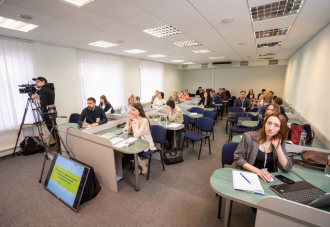Anti-money laundering and countering terrorism financing has always had an impact on nonprofit organizations, and with the Russian Federation’s full-scale war against Ukraine, additional risks have emerged. This is partly due to the sanctions policy against the aggressor state, and partly due to the large-scale humanitarian crisis.
However, Ukraine’s legislation in this area has other pitfalls that the sector should be aware of. For example, application of the standards of the Financial Action Task Force (FATF) may entail disproportionate requirements from banks or direct restriction of CSO access to financial services, onerous requirements for the entire nonprofit sector instead of targeted risk-based measures for NGOs in high-risk areas, and application of FATF standards to restrict basic human rights and CSO activities. To avoid these risks, it is vital to ensure an intersectoral dialogue involving global policymakers, local and national governments, competent authorities, financial institutions, and civil society organizations.
On June 7-9, 2022, regional conference “Consequences of the Invasion of Ukraine for the AML/CFT Regime for NPOs in the Eastern Partnership Countries” was held in Tbilisi, Georgia. The results of this important event, attended by experts from ISAR “Ednannia” and the Cenre for Democracy and Rule of Law together with representatives of some 40 organizations from around the world, were summarized as Recommendations for the public, private and civil society sectors “The Tbilisi Principles: Balancing the Need to Meet Urgent Humanitarian Needs with the Need to Maintain Financial Integrity”. The English version of the recommendations can be found here. We have also prepared a Ukrainian translation, so please take note of the recommendations for the Financial Action Task Force, the European Union, government/competent authorities, financial institutions, donor organizations, and civil society organizations.
It is as part of establishing an inter-sectorial dialogue, and as part of the National Risk Assessment 2022 that a meeting of CSO representatives took place on August 5, 2022, including members of the Consortium of ISAR “Ednannia”, the Ukrainian Center for Independent Political Research and CEDEM, as well as Tabletochki Charitable Foundation, Wings of Hope Charitable Foundation, Caritas Ukraine Charitable Foundation, Transparency International, Anti-Corruption Action Center. The meeting was organized and held by the State Financial Monitoring Service with the participation of representatives of the National Bank of Ukraine and the State Tax Service. The event was dedicated to the presentation and discussion of the results of the sectoral risk assessment prepared by the latter. During the meeting, the parties had the opportunity to agree on the next steps in their interaction and cooperation, the results of which will be published on the page of the project “Ukraine Civil Society Sectoral Support Activity”.
“The war in Ukraine has caused a humanitarian crisis and the need for a quick response on the part of civil society. At the same time, legislation on anti-money laundering and countering the financing of terrorism can affect the ability of civil society organizations in Ukraine to act and provide humanitarian assistance. In particular, because of the war in Ukraine, international banks may block the flow of funds to Ukrainian nonprofit organizations that are considered high risk for dirty money laundering and terrorist financing. “The Tbilisi Principles aim to reduce the requirements for financial criteria to meet the needs of people and countries in times of crisis,” noted Mariia Heletii, deputy project manager of the Ukraine Civil Society Sectoral Support Activity, ISAR “Ednannia”.
This material was created as part of the Project Ukraine Civil Society Sectoral Support Activity implemented by the Initiative Center to Support Social Action “Ednannia” in partnership with the Ukrainian Center for Independent Political Research (UCIPR) and Centre for Democracy and Rule of Law (CEDEM) with the sincere support of the American people through United States Agency for International Development.



